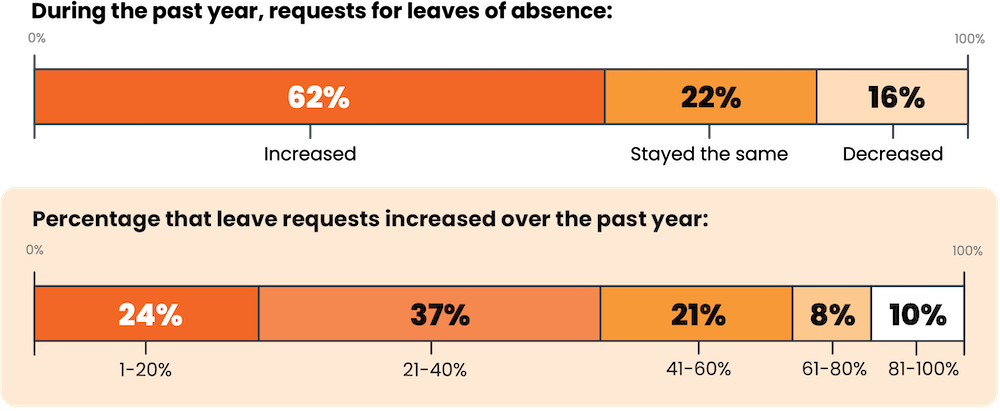The modern workforce is evolving fast. When we look at the rapid rise of remote work, the impact of new technologies such as AI, and major generational shifts, the workforce of today is not the workforce of just five years ago. We wanted to understand see how leaves of absence and workplace accommodations program are being impacted by these workforce changes.
Our 2024 survey of HR leaders at employers with over 5,000 employees uncovers their top challenges with both leave and workplace accommodations and what changes they have made to address these challenges. We also look at how leave and accommodations requests have changed over the past year, and the top reasons employees are requesting both.
For more in depth results and insights, download the full report.
#1. Leave and Workplace Accommodations Requests are Increasing
For the second year in a row, we find that most (62%) HR managers are seeing an increase in leave requests. Of those who reported an increase, 75% saw the number of leave requests increase by 20% or more. When we asked if accommodations requests had risen during the past year, 75% said they had. Of those employers that reported an increase in requests, 74% reported handling 20% or more requests than the prior year. All of this adds to a rapidly growing caseload of incoming requests for HR teams.

#2. Recruitment and Remote Work are Top Challenges for HR
HR managers are indeed experiencing challenges with current top-of-mind issues with today’s modern workforces. For every issue option we provided, more than half said they were struggling with them, with the top being recruitment and supporting hybrid and remote workforces. This comes as no surprise as today’s labor market remains tight, and hybrid and remote work becomes more desired – and even expected – by potential employees.

#3. Mental Health is the Most Frequent Reason Cited for Leave
When we asked employers what the main reasons employees gave for requesting leave, mental health challenges topped the list, even above illness and injuries, caring for a loved one, or parental leave. Given this dramatic rise in requests for mental health leave, it will be increasingly important for employers to understand the details of eligibility and employer requirements around these types of requests.

#4. Pregnancy, Mental Health, and Age-Related Conditions Drive an Increase in Accommodations Requests
Managing mental health also came in as a top reason for workplace accommodations requests. The other top factors were pregnancy and age-related conditions, showing that accommodating workers means much more than providing specialized equipment or chairs.

#5. Employers Continue to Add New Paid Leave Benefits
Employers adding new leave benefits continues to be a growing trend. For the second year in a row, we found that more than half of employers we surveyed are adding all kinds of new paid leave benefits – mostly to meet business goals around recruitment, retention, and employee experience. The top benefit being added is parental leave, followed closely by flexible time off and mental health days.

Conclusion
Leave and workplace accommodations continue to rise as workforce expectations evolve rapidly. With recruitment and retention topping the list of organizational challenges, companies are adding more leave benefits to attract and retain talent. More employers are embracing remote work and hiring talent across the United States, which requires having to understand the numerous state leave programs their workers are eligible for.
All of this points to an inflection point for leave and accommodations management, with more leave cases to manage, more complex laws to understand, and new policies to implement and track every year.
AbsenceSoft partners with numerous large employers to tackle the challenges of modern workforces. We help them stay compliant, efficiently manage large caseloads of requests, and deliver personalized leave programs to large, complex workforces. To see AbsenceSoft in action, we invite you to schedule a demo today with a Certified Leave Management Specialist.

